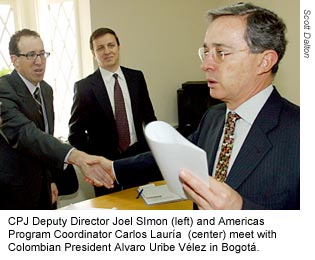Bogotá, Colombia, March 15, 2006–Colombian President Alvaro Uribe Vélez today expressed support for the work of provincial journalists who report under threat of violence and said that any official who impedes their work “is committing a crime against democracy.”
Uribe issued the statement at the urging of a delegation from the Committee to Protect Journalists, which met with the president this morning at his campaign headquarters in Bogotá to outline its concerns about the risks facing the Colombian press. Uribe is seeking a second term as president in elections scheduled for May 28.
The president reiterated his support for press freedom and said that while his administration does not like media outlets interviewing guerilla and paramilitary fighters, the government respected their right to do so. The issue is critical because provincial officials and military commanders have denounced journalists who use non-official sources. The president emphasized that any official who interferes with the work of the press, “is committing a crime, and this is extremely grave.”
Uribe also expressed support for journalists who report on corruption and said that while violence against journalists has declined it remains a major concern of his administration. “We will not be content until we can say that there is not one journalist threatened or murdered,” Uribe said. “What concerns me is that they keep killing journalists. This hurts me personally, and it hurts Colombia.”
Vice President Francisco Santos also attended today’s meeting with CPJ’s deputy director, Joel Simon, and its Americas program coordinator, Carlos Lauría.
CPJ asked the president to make the statement in response to ongoing concerns about self-censorship in Colombia, particularly in rural provinces where journalists are threatened by guerrillas and paramilitaries and pressured by military and civilian authorities. In 2006 alone, CPJ has documented three cases of provincial journalists forced to flee their homes because of threats and intimidation.
Diro César González, who published the weekly La Tarde, was forced to relocate to Bogotá in January after getting death threats. He also suspended publication of his newspaper, which published investigative reports on corruption, the armed conflict, and paramilitary activities in northeastern Santander province.
The same month, Jenny Manrique a reporter for the newspaper Vanguardia Liberal fled the city of Bucaramanga, also in Santander, after getting death threats for reporting on abuses by right-wing paramilitary forces. In February, reporter Olga Cecilia Vega was forced to leave the province of Caquetá after her life was threatened following a published interview with a guerrilla leader.
At today´s meeting, the vice president said he will conduct regular visits to provincial areas to meet with journalists and authorities in an effort to combat self-censorship.
A CPJ investigative report released in October, “Untold Stories,” documented widespread self-censorship in conflict-ridden areas. The report, written by Bogotá journalist Chip Mitchell, was based on interviews with more than 30 reporters in several strife-ridden provinces, including Arauca, Córdoba, and Caquetá. Journalists said they routinely muzzle themselves because they fear physical retribution from leftist guerrillas and right-wing paramilitaries, along with harassment from government troops and officials. In other cases, probing journalists said they were forced to abandon stories because of intimidation. Self-censorship is greatest in provincial areas, CPJ found, where the government’s presence is weak and state protection minimal.
Simon presented the report to Santos in a meeting last October. Read “Untold Stories.”
Twenty-eight Colombian journalists have been slain in the past decade, CPJ research shows, although deadly violence has tapered off in the past two years. One Colombian journalist was killed in 2005. But minimal state presence in vast areas of the country continues to leave journalists at the mercy of illegal armed groups. Journalists in Bogotá and other large urban centers work more freely than their colleagues in the country’s interior, but they, too, face pressure and intimidation. Government officials have sometimes contributed to the climate of fear by accusing journalists of having ties to the guerrillas.
As a result, CPJ’s analysis shows, coverage of issues vital to Colombian voters, including human rights abuses, crime, and corruption, is often circumscribed even as the May presidential election approaches.
CPJ also found that impunity continues to be the norm in Colombia. An overburdened justice system has been unable to solve the many cases of journalists slain over the past decade. CPJ reported in May that murder is the leading cause of job-related deaths among journalists worldwide and that murder with impunity is the most urgent threat to all journalists.
